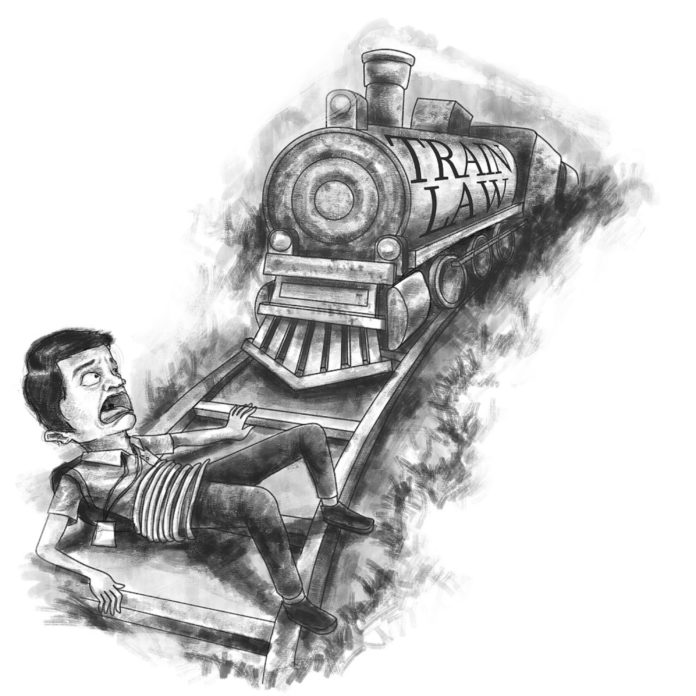WHEN President Rodrigo Duterte signed the Tax Reform for Acceleration and Inclusion (Train) bill into law, he promised a “simpler and fairer” tax reform program. But after months of implementation, income of small businesses are hurt amid the robust growth of certain industries.
With the second package of the Train Law coming, small businesses around the University are having a hard time keeping up with the increasing prices of commodities.
The Pit Restobar on Asturias Street had no choice but to keep its prices cheap to adjust with their customers’ budgets amid the inflation caused by Train Law.
“Our clientele are mostly students. ‘Di pwedeng sabayan `yong increase nong [Train] Law,” said the restaurant’s manager, who asked not to be named.
He added that their daily income slumped from P10,000 to P7,000 after the law was implemented, cutting the budget for operations.
Jaydee Garcia, owner of the Tapsilogan food stall in Sta. Cruz, Manila, said they were forced to buy products with higher taxes such as rice, sugar and soft drinks, because there were no alternatives.
Market vendors are forced to make do with inadequate income from selling goods, according to Jan Erven Ganacias, who teaches sociology at UST Senior High School.
“The purchasing power of an ordinary Filipino decreases as inflation rate increases. The amount of exemption is nothing because instead of savings, the exemption will be added to daily expenses,” he told the Varsitarian.
The law is also considered a “burden” to public utility vehicle drivers.
On July 6, the Land Transportation Franchising and Regulatory Board increased the minimum jeepney fare to P9 following the rise of crude oil prices. Aside from the increased tax on gasoline, higher excise taxes on fuels used for machines in vehicles also put a strain on the budget of drivers.
Under the Train Law, the excise tax per liter of fuel will increase to P4.50 in 2019 and it swell to P6.00 in 2020.
Steve Ranjo, secretary general of Piston transport group, said the law affected jeepney drivers’ take-home pay with the soaring prices of petroleum.
“Anumang pagkwenta ang gawin, mas malaki pa rin ang na-kaltas sa hawak nilang pera dahil sa matinding pagtaas ng presyo ng mga bilihin at serbisyo dulot ng Train Law,” said Ranjo in an online interview.
The cash voucher offered for jeepney drivers, worth P5,000, good for six months, is not sufficient for the transport groups’ expenses.
Ranjo said the cash voucher would allot P833 per month for drivers but with P75 spent daily for the fuel, a total o fP1,875 would be taken from their monthly salary.
On July 6, the Land Transportation Franchising and Regulatory Board increased the minimum jeepney fare to P9 following the rise of crude oil prices.
A 43-year-old tricycle driver, who refused to be named, said he needed to work two more hours to increase their daily income and pay for additional fees in their home.
“Sobrang tipid na yun kasi nagbabaon pa sa eskwelahan yung mga bata at nagbabayad pa kami ng bahay, tubig at ilaw,” the driver, father of two children, told the Varsitarian.
Despite exemption on income tax, the driver still paid P10,000 a month for their house with only P600 daily income.
Some students, however, lauded positive effects of Train Law despite the inflation it caused on commodities and services.
Mark Fernandez, UST journalism student, admitted that the tax increase helped him refrain from using cigarettes which he considered “great because those are not necessities.”
Under the law, P35 worth of tax on per pack of cigarettes was implemented from July 1 this year to December 31, 2019.
The Train law is the first package of the administration’s Comprehensive Tax Reform Program. It overhauled the country’s 20-year-old tax regime.
Section 2 of the Train Law mandates the government to enhance country’s tax system, improve levels of income and provide for health, education, jobs and social protection.
The tax reform exempts those with annual income of P250,000 from income tax, while those with P8 million would pay 35 percent of their salary for income tax.
Its full implementation started on January this year which immediately caused inflation or increased prices of sweetened beverage, tobacco, cosmetics and coal, among others.
The proposed Train 2 package opts to decrease income tax from 30 percent to 25 percent to open new chances for businesses and industries.
‘Priority to poor’
Ganacias stressed that the poor will never benefit from the Train Law unless the government will spend taxes on social services like education, housing, health and other social services.
Filomeno Sta. Ana, coordinator of Action for Economic Reforms, urged Filipinos to be vigilant on government’s spending of collected taxes which could heighten employment in the country.
“By creating the necessary infrastructure and funding human capital, we increase the productivity of our people and this will result in higher income and poverty reduction. It becomes favorable for investment which will lead to better jobs and income,” he said in a phone interview.
Ibon foundation, a local education and information development think-tank, said the tax reform would support the welfare of the rich as their monthly income would be relieved from higher tax cuts.
“The middle class deserve income tax relief but the richest or one percent of Filipinos with monthly incomes of P150,000 to over P7 million can afford to pay much higher taxes while still maintaining their luxurious standards of living,” the organization said in a statement last December 2017.
Section 82 of the Train Law stated that poor households must receive an Unconditional Cash Transfer worth P200 every month on the first year and P300 per month on the second and third year, offered by the Department of Social Welfare and Development.



















